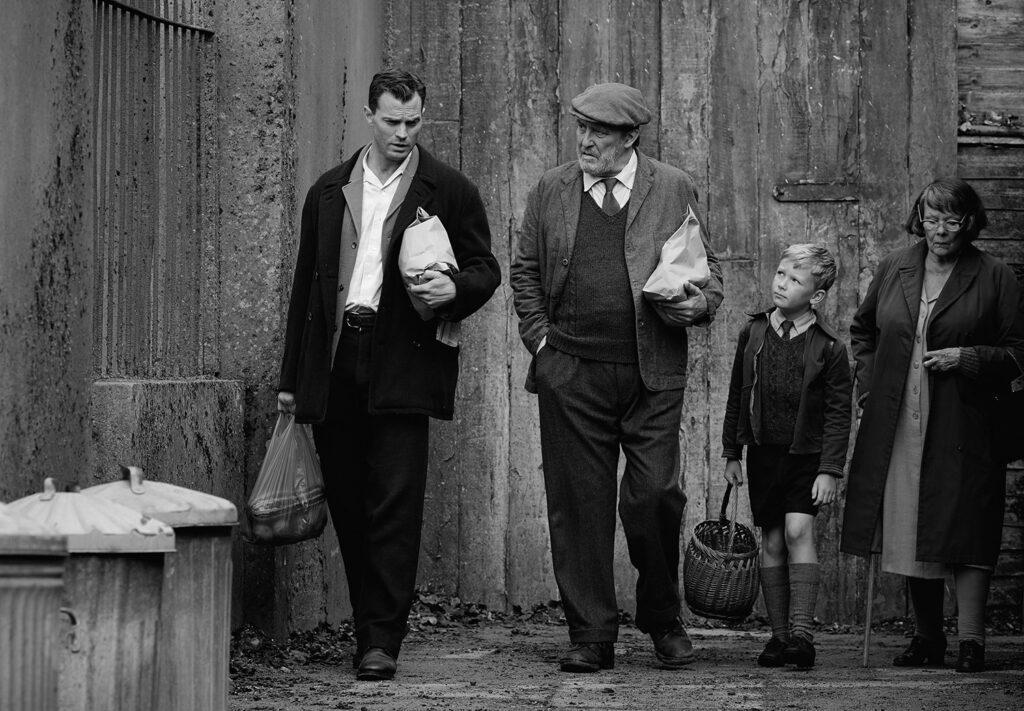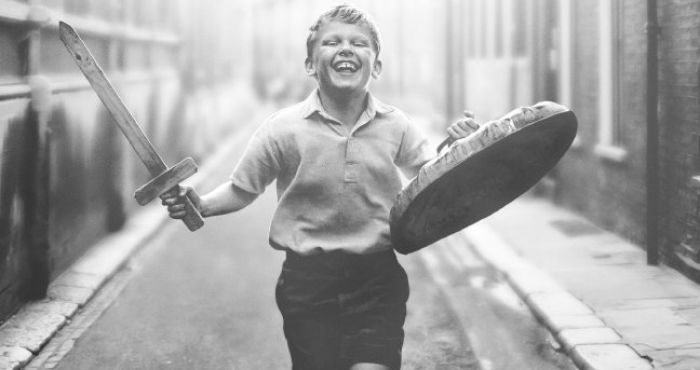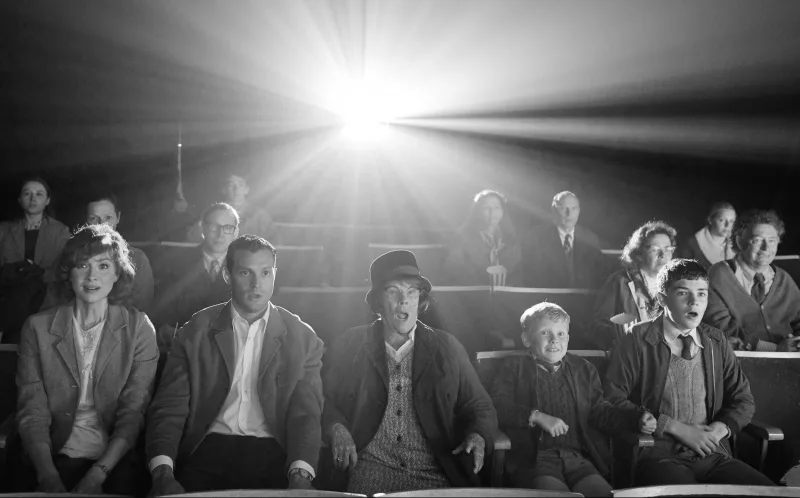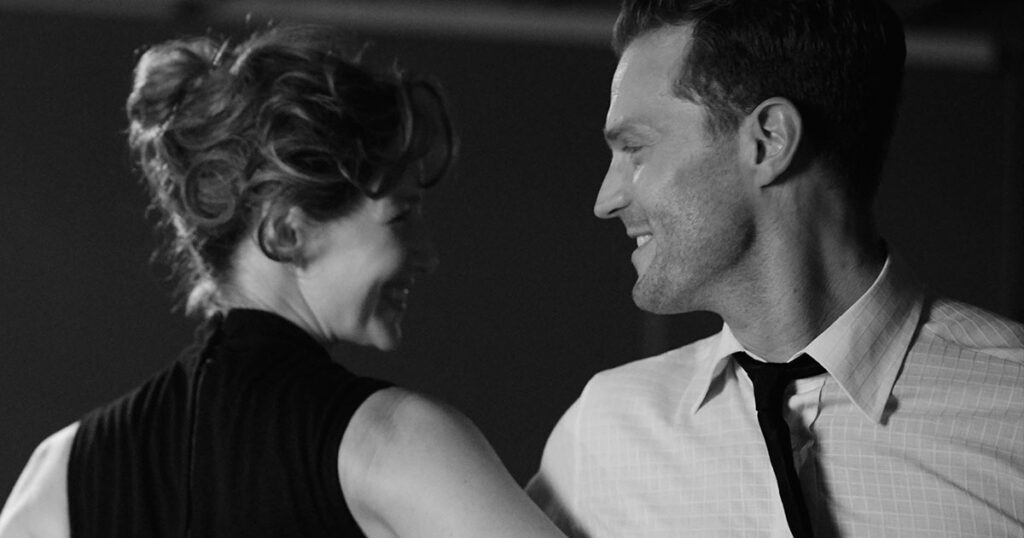
The opening scene of Belfast, the new film from Kenneth Branagh, announces the movie as both a narrow slice-of-life comedy and a more ambitious historical drama. Following some trivial narration from Judi Dench, the wan colors shift into crisp black-and-white, and the camera glides along a street in Northern Ireland, revealing a homey, intimate neighborhood. (A title card informs us that the date is August 1969.) The mood is relaxed and cheerful; children are kicking a ball around, adults are yammering idly, and everyone seems to know everybody’s name. Yet as nine-year-old Buddy (newcomer Jude Hill) traverses the road and spars good-naturedly with some shopkeepers, this peaceful idyll is shattered by the sudden arrival of armed hooligans. As they snarl threats and smash windows, the camera pivots around Buddy, spinning faster and faster, underlining his vulnerability and panic. What was once bliss has been replaced by terror.
Roughly based on Branagh’s own childhood, Belfast is a noble, enjoyable, not entirely successful attempt to document both sides of this formative coin. It seeks to frame the traditional hallmarks of the coming-of-age picture—the fledgling romances, the quixotically striving parents, the classroom grievances, the petty illegalities—against the backdrop of social unrest and religious conflict. That it struggles to fuse these disparate halves into a cohesive whole is due less to tonal inconsistency than cinematic execution, or maybe priorities. Over the course of a long and uneven career, Branagh has proved himself capable of working on a large scale—I remain a fan of his straitlaced Hamlet, while the operatic thriller Dead Again is arguably his best work—but here, whether because of lack of interest or inadequate filmmaking chops, he fails to invest the movie’s ostensibly sweeping commentary with much energy or clarity. He’s more committed to evoking the particular pleasures and predicaments of his youth with loving detail and misty-eyed nostalgia.

And once you accept it on those terms—as a playful and modest tale of boyhood, rather than an Important Film about the Troubles that plagued Northern Ireland for four decades—Belfast mostly works. It’s a sweet little movie populated by nice people who, despite their mild disagreements, all deeply care for one another. As the story’s hero, Buddy is inevitably beset by various problems—his long-running scheme to change seats in his schoolhouse is a sample challenge—that seem daunting to him, but which the viewer can appreciate as cute and conquerable. Yet he is also plainly loved—his parents, credited only as Ma and Pa, are tenderly played by Caitríona Balfe and Jamie Dornan, while Judi Dench and Ciarán Hinds portray his kindly paternal grandparents—and Belfast is a touching testament to the value of close-knit family.
It is also, as many Oscar-friendly pictures tend to be, an homage to the power of the movies themselves. Brewing internecine battle aside, Buddy’s life is one of routine—he plays sports with his friends, plugs away at his math homework with his grandfather, and gets into trouble with his cousin Frances (a charming Freya Yates)—and perhaps his favorite tradition involves weekly trips to the cinema, where he and his kin stare in wide-eyed wonderment at the latest Technicolor epic. Branagh allows the snippets of these larger-than-life adventures, which include Chitty Chitty Bang Bang and One Million Years B.C. (“Now I know why you dragged us to this,” Ma remarks to her husband upon the sight of Raquel Welch), to unfold in actual color, a fairly obvious technique that nonetheless communicates their exotic appeal—one that just might inspire an impressionable young boy to mature into a director.

Not that Belfast is especially autobiographical, or even self-serving. Spiritually speaking, it’s something of a gentle Protestant counterpoint to the anguished Catholicism of Angela’s Ashes, though Branagh isn’t really interested in exploring tribal discord. Indeed, most of the film’s glancing mentions of religion skew comic, as when Buddy loses sleep after attending a fire-breathing sermon about “the two roads” (one leading to salvation, the other not so much), or when Frances instructs him on how to “double-bluff” potential inquisitors. To the extent that Belfast carries a political point of view, it’s exemplified in Pa’s laudable, somewhat watered-down demonstration of tolerance. Catholics, he sagely explains to Buddy, are no different from Protestants, save their unfortunate need to go to confession.
Fair enough. But while Branagh’s insistence on providing a superficial account of the Troubles is in keeping with his choice to present most of the film’s events from Buddy’s perspective—a device reminiscent of The Florida Project, though he lacks Sean Baker’s follow-through—it hampers Belfast’s resonance, not to mention its sense of truth. The script supplies an antagonist in the form of Billy Clanton (Colin Morgan, faltering in a part that cries out for Cillian Murphy), a thuggish gangster who threatens retribution against any resident who harbors a Catholic or who refuses to commit to serving as a soldier in his holy war. That’s scary in theory, but there’s no real menace to the character, and Branagh fails to imbue the story’s broader implications with the requisite turmoil. The movie’s weakest scene is also its biggest set piece: the collective vandalism of a local market that morphs, suddenly and unconvincingly, into a Western-style standoff.

The clumsiness of that sequence stands in marked contrast to an earlier robbery, in which Buddy and Frances conspire to steal candy from a grocer; it’s fleet and funny, with Branagh shooting it entirely from the exterior and letting the cleverly timed dialogue do the work for him. For the most part, his craftsmanship here is sturdy and unshowy; he mixes in a few striking images—an overhead look down at that aforementioned street clash, a low-angle view of a funeral which may as well have been shot from the grave—but otherwise stays out of the way of his actors, all of whom are splendid. There are no standout performances—not because anyone is bad, but because the cast collaborates marvelously, complementing one another without upstaging. Dench and Hinds effortlessly conjure the rascally magic of a half-century-old marriage without lapsing into old-coot mugging, while Balfe and Dornan conceive a relationship that perches on the boundary between maturing warmth and cooling passion. All of the adults are wonderful scene partners for Hill, who capably evokes the anxious excitement of youth without being precious.
“All the Irish need to survive,” a character remarks at one point, “is a phone, a Guinness, and the sheet music to ‘Danny Boy.’” And despite its straining pretensions, Belfast succeeds precisely because it embraces that level of easy comfort. The nominal engine that drives its plot is the family’s freighted decision over whether to flee their homeland’s escalating violence for a safer life in England, but there’s little suspense to their predicament; the film is simply too pleasant to be tense. That may sound like faint praise, but there’s real beauty to its restraint; the tentative quasi-romance that blossoms between Buddy and a blond classmate is poignant specifically because it avoids clichéd embarrassment, while the more genuine affection between his parents is cemented during a lovely scene in which Dornan croons “Everlasting Love” to a bouncy Balfe. (Speaking of music, the saxophone-heavy score comes courtesy of Belfast native Van Morrison.) And at a breezy 97 minutes, it takes care not to overstay its welcome. Belfast is hardly a great movie—certainly not the kind that will implant itself in the memories of a burgeoning cinephile. But its lustrous black-and-white images still tend to come through in sharp, vibrant color.
Grade: B
Jeremy Beck is the editor-in-chief of MovieManifesto. He watches more movies and television than he probably should.
